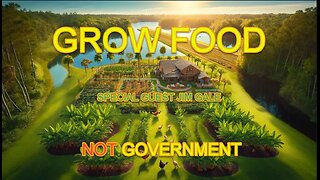Kate Mason and the synthetic food transformation
Kate Mason has a long history in welfare and community development. She's been looking in to government and corporate plans over the last few years to try to understand what is going on in the global arena and how it is affecting regular Australian people and the environment.. Kate is concerned that we are heading in to a heavily surveilled and regulated world where there is no genuine human autonomy, A world where children, vulnerable people and nature are being monetized and made in to a market for wealthy corporate entities to profit off. What she sees being implemented is a dictatorship, under the guise of the common good.
Managed Retreat. and some of the big names behind it.
Natural Asset Market (putting a price on "eco system" services e.g. trees giving us oxygen. It's in our government plans. And will be connected to managed retreat, it's where corporate entities can own nature and have rights to it.
These three areas are all connected- they will be used to transfer ownership over to the wealthiest.
"I would like to get some eyes on two aspects of the impact market-"
~Kate
Natural Asset Companies- commodifying nature and putting it on the stockmarket, to be additionally rolled out through the Aboriginal corporations. This is nature that could not previously be touched. National Parks etc and land given to Indigneous land councils and organisations.
Social Impact Bonds- Commodifying people -homelessness, mental health, children's education, disability, aged care etc. It's an impact investing model. Investors put $$ in- the NGO tenders for the $$. According to metrics achieved the government pays the principal plus a profit return of around 10 percent per year. Treasurer Chalmers has put this on the map with the wellbeing budget released this year. It is extraordinarily concerning as these are the same corps who are setting policy with government and then profiting off the problems which the policies create.
-
 1:07:59
1:07:59
Tim Picciott - The Liberty Advisor
1 month agoGrow Food Not The Government With Jim Gale
78 -
 6:59
6:59
Politics of the NWO
1 month agoWhere is Kate Middleton?
2643 -
 10:56
10:56
The People's Voice
2 months agoRoyal Insider: Kate Middleton Was Sacrificed and Replaced With Body Double
316K143 -
 28:30
28:30
Talk Truth
30 days agoTalk Truth 05.01.24 - Catherine Austin Fitts - Part 2
4.63K4 -
 16:48
16:48
NoteWar
24 days agoThe transformation of our food systems - Sustainable Development Goal 2
38 -
 1:31:07
1:31:07
The Delingpod: A James Delingpole Podcast
2 months ago $10.31 earnedLaura Marion
5.47K29 -
 9:38
9:38
Aisling O'Loughlin News
2 months agoROYAL MESS TWO: KATE MIDDLETON LOCATED. OR HAS SHE?
1.49K5 -
 10:56
10:56
RAVries
2 months agoRoyal Insider: Kate Middleton Was Sacrificed and Replaced With Body Double
1.22K4 -
 33:33
33:33
IntelQuant
2 months agoKate Middleton AI Cancer PsyOp 4.0
1932 -
 4:10
4:10
Ainsley Earhardt
2 months agoKate Middleton's diagnosis raises awareness of need for cancer screenings
1101